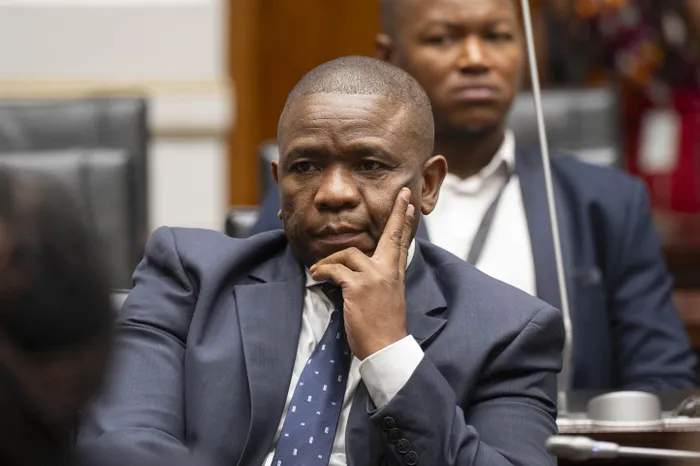Mkhwanazi reveals how social media fueled the July 2021 unrest and the government's failure to act on his shutdown request

KwaZulu-Natal SAPS commissioner Lieutenant-General Nhlanhla Mkhwanazi wants an investigation into how IPID interacted with forensic investigator Paul O’Sullivan.
Image: Armand Hough/Independent Newspapers
In his testimony to Parliament, KwaZulu-Natal police commissioner Nhlanhla Mkhwanazi disclosed that his call for a social media shutdown during the July 2021 unrest was ignored by a security minister, highlighting government inaction.
Testifying before Parliament’s ad hoc committee, Mkhwanazi said the looting and destruction had started with isolated acts of anger, but quickly escalated as social media platforms like WhatsApp were used to mobilise, share instructions for making petrol bombs, and encourage the looting of food items like "polonies and cheese".
He described how the chaos began in places like Eshowe, where “a truck here with sand” was stopped, offloaded into the road to cause a distraction, and then amplified on social media.
“And then people say, ‘oh, now they are doing it in John Ross, in Empangeni, they’re doing it at Eshowe, that's also at Umkomaas,” he said. “They ban the truck, and because of the social media communication, people get fuelled then from there.”
Mkhwanazi said that as the unrest grew, social media posts spread rapidly, allowing people to coordinate attacks and share messages like, “This is how you make a petrol bomb. Let’s come together. Let’s go and break into that place.”
“It’s not something that was originally planned. It’s something that evolved as it happened, because of the anger from people,” he told the committee.
He added that even public figures helped fuel the chaos. “We had the Ngizwe’s that decided, ‘let me go and encourage the Gauteng people to join in’,” he said, referring to former Ukhozi FM DJ Ngizwe Mchunu, who was later arrested in connection with incitement.
He also said “the president’s daughter” had posted on social media at the time, saying things like “we see you in that area”, which he claimed helped escalate tensions.
Mkhwanazi was blunt in his assessment of government’s failure to contain the unrest, saying: “Yes, we should have shut down social media.”
He said platforms like WhatsApp were used to coordinate looting and that if a shutdown had happened, “they would not have communicated, they would not have mobilised each other easy.”
He also revealed that surveillance equipment bought by Crime Intelligence was not used during the crisis because a minister refused to sign off its deployment.
“We had gadgets that were kept in the storeroom, because one of the ministers was supposed to sign and give us permission to use it, did not want to sign. As a result, we couldn’t listen to the phones,” he said.
“We had equipment that we had bought and it was sitting at Crime Intelligence offices not being used.”
Mkhwanazi pointed to a broader collapse in the country’s security capability. “The security cluster as a whole has been weakened over time. And the one that has been weakened the most of them all is the military,” he said.
“If everything fails from the South African Police Service, those are the big brothers we must go to. If we can’t go to them because we are better off than them, then there’s a problem in the country.”
He stressed that while he was not advocating for military funding, South Africa’s safety relied on a functioning security structure ,starting with the military, then intelligence, then the police. “If we’re not taking the security service seriously, we’re not going to have a country at all,'' said Mkhwanazi.
Mkhwanazi also questioned the role of media coverage during the unrest, saying that transparency sometimes encouraged lawlessness. He suggested that the widespread broadcasting of violent incidents may have unintentionally led to copycat behaviour.
Recalling remarks by a former SABC executive, he said: “He once said, ‘Do not publish this violence that is happening here, because you are encouraging other people to learn from this.’”
“The former boss of the SABC is not necessarily my favourite person,” Mkhwanazi told the committee, “but what he said might not have been wrong.”
He added that social media amplified the chaos: “The social media that captured the wrong that happened during the riot when it started encouraged more wrong to happen on the day.”